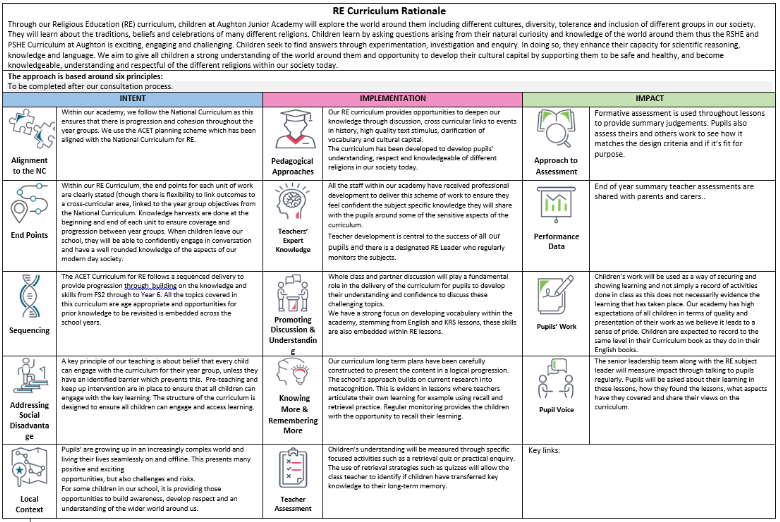RE
At Aughton Junior Academy, we follow the NATRE RE Today curriculum with the intent that our children will become resilient, accepting, mindful and inquisitive learners.
Intent
The R.E. curriculum allows children to discover and gain an insight into religions within the world that we live. We see the teaching of R.E. is vital for children to understand others beliefs and make connections between their own values. It is our role to ensure pupils are being inquisitive by asking questions about the world around them by allowing pupils to gain high quality experiences.
Implementation
RE in FS2
RE in the Early Years Foundation Stage is taught through the ‘Understanding the World’ strand. Children find out about beliefs, special times, listening other opinions and perspectives and they will talk and describe their immediate family. Children in our foundation all make like with the community and people who are familiar to them. Through continuous provision and adult led activities children are motivated to ask questions about why things happen and how things work. They are encouraged to explore the world around them and be inquisitive. .
The key skills and curriculum goals in Foundation at Aughton focus on communicating effectively and developing new language and vocabulary ensures our pupils are prepared for the next stage of their education.
This may be taught during whole class inputs, small group activities and learning zones. Challenges in continuous provision. During times of celebration such as Diwali, Christmas, Easter, Eid and much more the classroom will have some provision areas linked to this.
RE in KS1
RE is delivered to our pupils through a creative and flexible programme of study. Pupils will learn about the different religions from around the world, their beliefs and their culture. They will be able to form an understanding of their own sense of belonging within their own and other religious views. Teachers will encourage pupils to ask questions so that other pupils can give their opinion on the matter in hand. Pupils will also develop an understanding of religious celebrations and festivals along with the stories, meaning and messages often associated with them. Generally RE is carried out through first-hand experiences such as visits but there is often an emphasis on using photographs and videos to deepen their knowledge.
RE in KS2
RE is taught with an emphasis on creativity and flexibility. In KS2 children begin to describe and make connections between different features of the religions and world views they study, discovering more about celebrations, worship, pilgrimages and the rituals which mark important points in life. Pupils are encouraged to reflect on their own views about belonging, meaning, purpose and truth, applying ideas of their own thoughtfully in different creative forms e.g. reasoning, music, art and poetry. Pupils are encouraged to consider and challenge the views of others thoughtfully. They are introduced to an extended range of sources and subject specific vocabulary. The children consider and apply ideas about ways in which diverse communities can live together for the well-being of all, responding thoughtfully to ideas about community, values and respect.
Assessment
RE is assessed formatively throughout lessons to provide summary judgements using assessment for learning, KWLs and Flashback Five and summatively using end of year judgements to show if a pupil is meeting the expected standard for RE.
This will be collected through pupil voice and work in books . Pupils will be asked what they know now that they didn’t know before, what they remember and how much they have enjoyed it.
Impact
We will deliver a curriculum that:
- Celebrates and raises awareness and understanding of diverse and rich communities around Aughton Junior Academy.
- Inspires creative learning through excellent teaching practices that build on prior R.E. learning and allow for repetition and progression of skills that build upon high starting points.
- Our curriculum embraces the community in which it is situated, recognising local places of worship including: church, mosque, cathedral and temple.
- Is inclusive, develops self-confidence and identifies that all our children are unique and therefore we should all be tolerant of each other’s beliefs.
- Encourages our children to be inquisitive about others beliefs developing inquiry based R.E. skills that allow them to culturally aware of the world around them.
- Promotes equality and understanding of the British values and ensures they are prepared for life in modern Britain.

The Right of Withdrawal from Religious Education:
Religion and belief have become more visible in public life in recent years, making it important that all pupils should have an opportunity to engage in RE.
Parents who wish to withdraw their children from RE should be aware of its aims and what is covered in the RE curriculum and that they are given the opportunity to discuss this if they wish. It should be made clear whether the withdrawal is from the whole RE curriculum or specific parts of it. No reasons need be given
(Section 71(3), School Standards and Framework Act 1998).